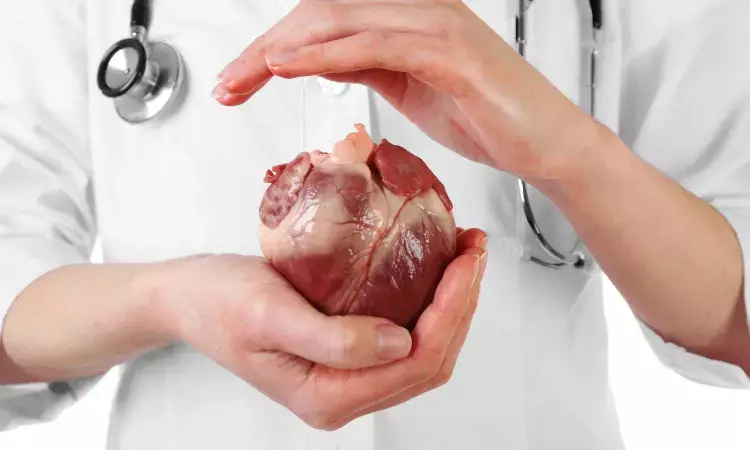- Home
- Medical news & Guidelines
- Anesthesiology
- Cardiology and CTVS
- Critical Care
- Dentistry
- Dermatology
- Diabetes and Endocrinology
- ENT
- Gastroenterology
- Medicine
- Nephrology
- Neurology
- Obstretics-Gynaecology
- Oncology
- Ophthalmology
- Orthopaedics
- Pediatrics-Neonatology
- Psychiatry
- Pulmonology
- Radiology
- Surgery
- Urology
- Laboratory Medicine
- Diet
- Nursing
- Paramedical
- Physiotherapy
- Health news
- Fact Check
- Bone Health Fact Check
- Brain Health Fact Check
- Cancer Related Fact Check
- Child Care Fact Check
- Dental and oral health fact check
- Diabetes and metabolic health fact check
- Diet and Nutrition Fact Check
- Eye and ENT Care Fact Check
- Fitness fact check
- Gut health fact check
- Heart health fact check
- Kidney health fact check
- Medical education fact check
- Men's health fact check
- Respiratory fact check
- Skin and hair care fact check
- Vaccine and Immunization fact check
- Women's health fact check
- AYUSH
- State News
- Andaman and Nicobar Islands
- Andhra Pradesh
- Arunachal Pradesh
- Assam
- Bihar
- Chandigarh
- Chattisgarh
- Dadra and Nagar Haveli
- Daman and Diu
- Delhi
- Goa
- Gujarat
- Haryana
- Himachal Pradesh
- Jammu & Kashmir
- Jharkhand
- Karnataka
- Kerala
- Ladakh
- Lakshadweep
- Madhya Pradesh
- Maharashtra
- Manipur
- Meghalaya
- Mizoram
- Nagaland
- Odisha
- Puducherry
- Punjab
- Rajasthan
- Sikkim
- Tamil Nadu
- Telangana
- Tripura
- Uttar Pradesh
- Uttrakhand
- West Bengal
- Medical Education
- Industry
Obesity associated with lower use of RBC transfusions in cardiac surgery

A new study published in European Journal of Cardio-Thoracic Surgery suggests that obesity was not linked to 30-day mortality, however it was linked to less utilization of red blood cell transfusions in heart surgery.
Obesity increases the burden of cardiovascular risk factors, morbidity, and death. Several studies, however, have shown that obese patients have a better outcome after cardiac surgery than normal weight patients, a phenomenon known as the obesity paradox. Obesity has also been related to a lower demand for red blood cell transfusions. Jenni Räsänen and colleagues undertook this study to assess the influence of BMI on 30-day mortality and red blood cell transfusions in patients after heart surgery, a clinically significant subject with inconsistent previous findings.
The study included 1691 patients who underwent coronary, valve, or aortic root surgery with cardiopulmonary bypass between 2013 and 2016. The patients were classified according to their BMI using World Health Organization criteria. For the analysis, logistic regression with correction for relevant confounding variables was utilized.
The key findings of this study were:
1. 28.7% of the patients were normal weight, 43.3% were overweight, 20.5% were slightly obese, and 7.5% were extremely obese.
2. The 30-day death rate was 1.9%, with no statistically significant variations across body mass index groups. Red blood cell transfusions were administered to 41.0% of patients.
3. Overweight (odds ratio [OR] 0.75, 95% CI 0.56-0.99, P = 0.045), slightly (OR 0.65, 95% CI 0.46-0.92, P = 0.016), and severely obese (OR 0.41, 95% CI 0.24-0.70, P =0.001) patients required fewer red blood cell transfusions than normal weight patients.
Those with a greater BMI were less likely to require red blood cell transfusions. This finding supports earlier research that suggests larger-bodied individuals may have better surgical results.
Reference:
Räsänen, J., Ellam, S., Hartikainen, J., Juutilainen, A., & Halonen, J. (2023). Association of body mass index with 30-day mortality and red blood cell transfusions in open heart surgery. In European Journal of Cardio-Thoracic Surgery. Oxford University Press (OUP). https://doi.org/10.1093/ejcts/ezad162
Neuroscience Masters graduate
Jacinthlyn Sylvia, a Neuroscience Master's graduate from Chennai has worked extensively in deciphering the neurobiology of cognition and motor control in aging. She also has spread-out exposure to Neurosurgery from her Bachelor’s. She is currently involved in active Neuro-Oncology research. She is an upcoming neuroscientist with a fiery passion for writing. Her news cover at Medical Dialogues feature recent discoveries and updates from the healthcare and biomedical research fields. She can be reached at editorial@medicaldialogues.in
Dr Kamal Kant Kohli-MBBS, DTCD- a chest specialist with more than 30 years of practice and a flair for writing clinical articles, Dr Kamal Kant Kohli joined Medical Dialogues as a Chief Editor of Medical News. Besides writing articles, as an editor, he proofreads and verifies all the medical content published on Medical Dialogues including those coming from journals, studies,medical conferences,guidelines etc. Email: drkohli@medicaldialogues.in. Contact no. 011-43720751


